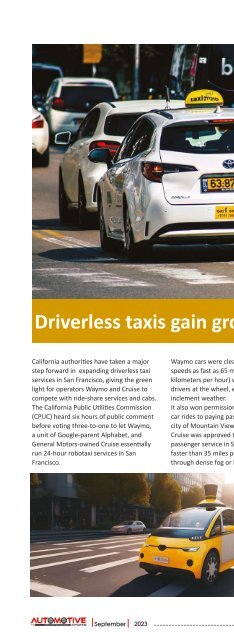Automotive Exports September 2023
Create successful ePaper yourself
Turn your PDF publications into a flip-book with our unique Google optimized e-Paper software.
Driverless taxis gain ground in San Francisco<br />
California authorities have taken a major<br />
step forward in expanding driverless taxi<br />
services in San Francisco, giving the green<br />
light for operators Waymo and Cruise to<br />
compete with ride-share services and cabs.<br />
The California Public Utilities Commission<br />
(CPUC) heard six hours of public comment<br />
before voting three-to-one to let Waymo,<br />
a unit of Google-parent Alphabet, and<br />
General Motors-owned Cruise essentially<br />
run 24-hour robotaxi services in San<br />
Francisco.<br />
Waymo cars were cleared to travel at<br />
speeds as fast as 65 miles per hour (105<br />
kilometers per hour) without human<br />
drivers at the wheel, even in some<br />
inclement weather.<br />
It also won permission to offer driverless<br />
car rides to paying passengers in its home<br />
city of Mountain View, in Silicon Valley.<br />
Cruise was approved to run fared<br />
passenger service in San Francisco at no<br />
faster than 35 miles per hour and not<br />
through dense fog or heavy smoke.<br />
Previously, Cruise could charge customers<br />
only during certain hours of the day.<br />
Waymo had not been allowed to charge for<br />
rides without a human driver on board.<br />
Driverless cars were first introduced in San<br />
Francisco in 2014 with a mandatory human<br />
“safety driver” on board.<br />
Four years later, California scrapped its<br />
requirement for a human driver to be in<br />
the car.<br />
The CPUC session drew commenters from<br />
all sides of the issue, with some calling<br />
robotaxis unsafe menaces while others<br />
lauded them as solutions to everything<br />
from climate change to road rage.<br />
Driverless cars have gotten stuck in the<br />
middle of roads, blocked bus lanes or<br />
even interfered in police or firefighter<br />
operations.<br />
But others at the hearing praised the<br />
vehicles for giving independence to people<br />
with disabilities, making roads safer and<br />
helping eliminate discrimination.<br />
Others opposed cars of any kind, saying<br />
the future lies in clean, convenient and<br />
affordable public transit.<br />
<strong>September</strong> <strong>2023</strong> 70

















